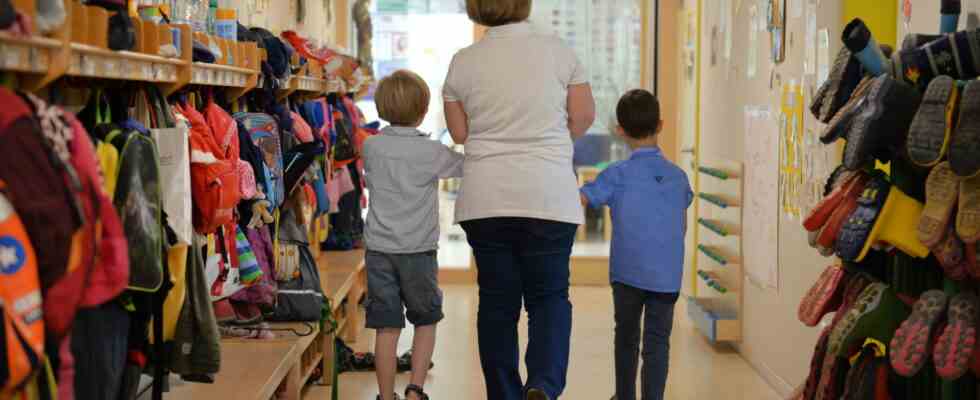Status: 09/19/2022 10:12 a.m
Since 2016, the federal government has been funding day-care centers that are particularly concerned with promoting children’s language skills. But the program is coming to an end. Educators are sounding the alarm – and the federal states are also putting pressure on them.
Several hundred educators demonstrated in Berlin at the beginning of May for the preservation of the so-called language day-care centers. Sandra Mielke from Thuringia was also there. She advises day-care centers that are particularly concerned with promoting children’s language skills.
Mielke fears for her job. The language day-care centers for which Mielke and another 7,000 specialists work are funded by the federal government – for now. The program expires at the end of the year. Language support is to be integrated into a new law, but Mielke is skeptical. “Once the program ends and the specialists have left, there’s no point in using the Quality Act later to promote language education.” Then people are gone.
Every eighth daycare center is a language daycare center
Currently, every eighth day-care center benefits from the federal language day-care center program. After the end of the program, language support is to become part of the planned Kita Quality Act, announced Federal Family Minister Lisa Paus. The Greens politician wants to spend a total of four billion euros on the proposed legislation over the next two years.
However, there are no funds beyond that for language support alone. In the Kita Quality Act, language support is only one of several fields of action. In the future, the federal states should also participate in the financing. “In fact, it’s also federal money, but it’s no longer a model project, it’s regular funding. That’s what we want to create.”
language day-care centers
Since 2016, the federal government has been funding additional staff at daycare centers for language development, especially at facilities with many children who need language support. From next year, according to the will of Federal Family Minister Lisa Paus, the federal states should take over the funding. But there is resistance to this. The Bundesrat called on the federal government to extend the “Language Daycare Centers” funding program beyond 2022 and to consolidate it as a permanent federal program. This was decided unanimously by the Chamber of States at its most recent meeting. According to the federal states, almost 7,500 additional specialists are currently working in around 6,900 day-care centers thanks to federal funding. In order to be able to continue to employ the employees of the language day-care centers from January 1st to July 1st, 2023, transitional financing is necessary.
Petition from the SPD
With the Kita Quality Act, Federal Minister for Family Affairs Paus not only angered many educators, but also politicians from the traffic light coalition. Erik von Malottki, family politician in the SPD parliamentary group, even collected signatures for a petition. He supports the new law brought into the cabinet by Paus. However, von Malottki criticizes the fact that the federal states are left alone with the financing of the language day-care centers: “That doesn’t save the language day-care centers because these things are either already being used for quality measures or are already being planned. That means the language day-care centers and to support language promotion, we need additional funds. And we cannot dictate that to the countries.”
Educator Mielke also doubts that the money will end up going to the language daycare centers. “It is important not to be satisfied with the law, but to continue to support the federal program. And how the federal states ultimately invest the money is up to each state. That means we take the money for the language, then we have to we’ll shorten it somewhere else.”
16 individual negotiations
Family Minister Paus reassured that the federal and state governments now have to negotiate. In order for money to flow regularly from the federal government through the Kita Quality Act, the federal government has to negotiate individually with all 16 states. This takes a while. The Kita Quality Act is scheduled to come into force on July 1, 2023. Until then, the federal government will continue to finance the language daycare centers, Paus assures. “But it is now up to the federal states to take up the ball and actually transfer it to standard funding.”
Sandra Mielke hopes to be able to continue working for her language day-care centers in the coming year. Erik von Malottki’s petition, which she also signed, has now received more than 50,000 signatures. The Bundestag will have to deal with the matter again in the autumn. The pressure on politicians to find a quick solution for the language day-care centers remains.

